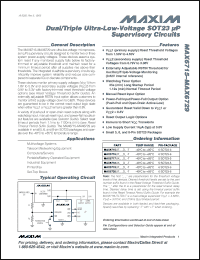|
|

|
|
| Partname: | MAX6718UKYHD4-T |
| Description: | Dual/Triple Ultra-Low-Voltage SOT23 µP Supervisory Circuits |
| Manufacturer: | Maxim Integrated Products |
| Datasheet: | PDF (715K).
Click here to download *) |
The MAX6715MAX6729 are ultra-low-voltage microprocessor (P) supervisory circuits designed to monitor two or three system power-supply voltages. These devices assert a system reset if any monitored supply falls below its factorytrimmed or adjustable threshold and maintain reset for a minimum timeout period after all supplies rise above their thresholds. The integrated dual/triple supervisory circuits significantly improve system reliability and reduce size compared to separate ICs or discrete components. These devices monitor primary supply voltages (VCC1) from 1.8V to 5.0V and secondary supply voltages (VCC2) from 0.9V to 3.3V with factory-trimmed reset threshold voltage options (see Reset Voltage Threshold Suffix Guide). An externally adjustable RSTIN input option allows customers to monitor a third supply voltage down to 0.62V. These devices are guaranteed to be in the correct reset output logic state when either VCC1 or VCC2 remains greater than 0.8V. A variety of push-pull or open-drain reset outputs along with watchdog input, manual reset input, and power-fail input/output features are available (see Selector Guide). Select reset timeout periods from 1.1ms to 1120ms (min) (see Reset Timeout Period Suffix Guide). The MAX6715MAX6729 are available in small 5, 6, and 8-pin SOT23 packages and operate over the -40C to +85C temperature range. |
|

Click here to download MAX6718UKYHD4-T Datasheet*) |
 |
| *)Datasheets downloading from ChipDocs is only for our members (paid service). REGISTER NOW for your membership. |
|
|
|

